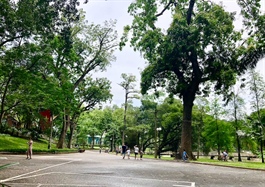Reviews set after Thu Thiem episode
Reviews set after Thu Thiem episode
Real estate-backed credit packages and corporate bonds are to be strictly constrained under the fresh legislation of the competent authorities.

Hot on the heels of Tan Hoang Minh Group’s withdrawal from the auction bidding in Thu Thiem New Urban Area, the State Bank of Vietnam (SBV), together with its subsidiary, the SBV Banking Supervision Agency, formally sent a request to a number of lenders urging them to review and report on credit inflows to customers who engaged in the land use rights in the area.
Officials from commercial bank SHB last week voiced their confirmation that no credit had been granted to clients participating in the newly developed urban region of Thu Thiem. SHB is the second commercial bank to formally express its opposition to providing credit to those who participate in the land sale.
Previously, Vietcombank’s officials also determined no credit extensions to firms related to the Thu Thiem land auction had taken place.
Elsewhere, the SBV issued Circular No.16/2021/TT-NHNN, replacing two previous circulars, regulates the purchase of corporate bonds by credit institutions and foreign bank branches, and is in effect since January 15.
“Looking closer at Circular 16, we find that the regulation focuses on three major perspectives: the principle of buying and selling corporate bonds, internal regulations, and the responsibilities of credit institutions when buying and selling corporate bonds,” Vietcombank Securities Company (VCBS) stated.
Specifically, the message is that the bad debt ratio is at a safe level and credit quality comes first. Corporate bond products also have strict regulations on selection criteria and trading principles. The regulator also paid special attention to internal regulations for periodic monitoring and evaluation, as well as giving more initiatives to the banks.
Notwithstanding, prior to the SBV’s fresh restriction on corporate bond issuance, a consortium of firms participating in the Thu Thiem land auction borrowed around $622.5 million from bond issuance in the second half of 2021.
According to the Vietnam Bond Market Association, the domestic corporate bond market saw a total of 80 domestic private placements in December alone, totalling $2.9 billion in mobilised capital, making up for 14.5 per cent of the whole sector.
The central bank and commercial banks will continue to tighten their grips on high-risk lending sectors such as stocks and real estate, as said earlier by the Deputy Governor of the SBV, Dao Minh Tu.
Recent findings by the SBV revealed in December showed the real estate sector only raised more than $413 million via private bond issuances, mostly from those firms participating in the Thu Thiem land auction, lagging behind the banking group in terms of capital raised.
Minister of Finance Ho Duc Phoc also elaborated that bond issuance restrictions will be specifically implemented for property companies with losses and bad debts in order to prevent market disruption.
“In some cases, the amount of borrowed money from bonds exceeds the amount of issuers’ equity, yet corporate bonds are nevertheless issued to raise cash. A disruption of the market, such as the land auction in Thu Thiem, is peculiar and unprecedented,” the Minister assessed.
VCBS expressed its support for the new circular, stating that it will affect approximately 20 per cent of the new bond issuance. “The circular will direct credit institutions to trade quality corporate bonds, ensuring cash flow in the form of bond purchases or loans and, at the same time, managing credit risks that may arise in the future. These will be crucial components for the long-term buying and holding activities of credit institutions’ corporate bond portfolios.”
Simultaneously, the fresh stimulus package from the National Assembly was adopted earlier in mid-January. The package, worth around $15.2 billion, is to assist socioeconomic recovery and development and is meant to be rigorously regulated with particular measures.
“If not, a part of this gigantic package would be shifted into risky landscapes, such as real estate,” said economist Dinh Trong Thinh.























